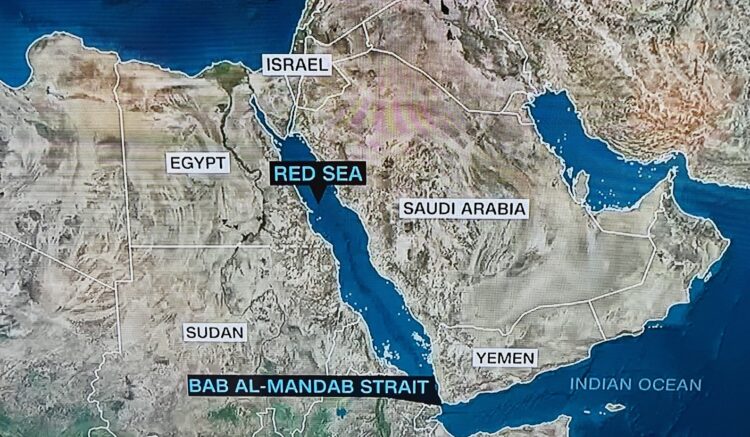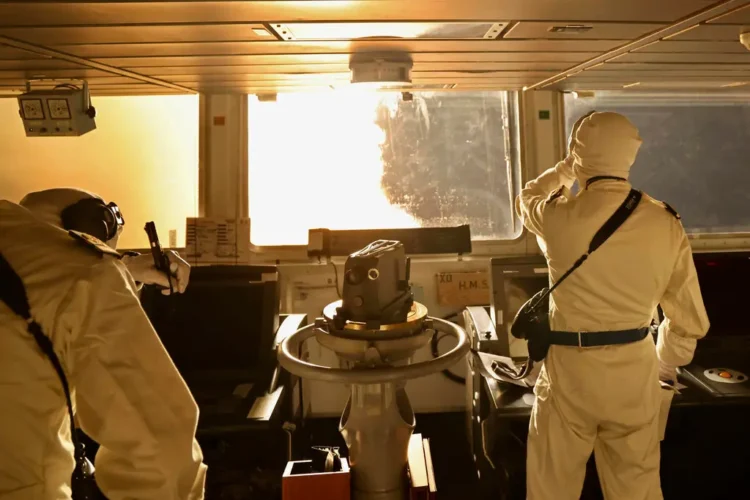Since the eruption of the Israel-Hamas war in the Gaza Strip more than three months ago, the United States, Israel’s chief ally, has struggled to prevent it from spreading to the rest of the Middle East.
To deter Iran and its proxies in Lebanon, Syria, Iraq and Yemen from intervening in the war Israel is currently waging against Hamas, the Biden administration dispatched two aircraft carrier strike groups to the eastern Mediterranean Sea and the Persian Gulf and issued a series of stern warnings.
Until 24 hours ago, U.S. efforts to head off a regional conflict were moderately successful, despite Hezbollah’s armed intervention in the war on behalf of Hamas and Houthi missile and drone attacks against commercial shipping in the Red Sea, through which about 15 percent of world trade passes.

Last night, however, the United States and several of its allies were directly drawn into the war in response to continual Houthi aggression since November.
U.S. and British aircraft and an American submarine struck more than a dozen Houthi drone and missile launch sites, radar stations and weapons storage areas in Yemen, much of which has been controlled by the Houthis for the past decade.
The operation was logistically supported by Canada, Bahrain, Holland and Australia.
U.S. President Joe Biden said he would not hesitate to order more reprisal raids to protect “the free flow of international commerce.”
The Houthi leader, Abdul-Malik al-Houthi, was defiant, promising a fierce response. “We are comfortable with a direct confrontation with the Americans,” he declared just hours after missiles slammed into Houthi military targets across Yemen, which has been embroiled in a civil war for about 10 years now.
On the morning after the strikes, White House spokesman John Kirby said the retaliatory strikes were not intended to spark a wider regional war. “We’re not interested in a war with Yemen. We’re not interested in a conflict of any kind. Everything the president has been doing has been trying to prevent any escalation of conflict, including the strikes last night.”
Prior to January 12, the Biden administration tried to separate the current war in Gaza from the ongoing Houthi attacks in the Red Sea, claiming they were two distinct issues. In fact, they are intrinsically related, as the Houthis have consistently said.
Militarily and financially backed by Iran, Israel’s deadliest enemy, the Houthis began attacking commercial vessels in the Red Sea following the outbreak of the Israel-Hamas war on October 7, the day 3,000 Hamas terrorists invaded southern Israel, killed 1,200 Israelis and foreigners and kidnapped some 240 hostages.
The Houthis also fired missiles toward the Israeli port of Eilat, all of which were intercepted by the U.S. Navy and the Israeli Air Force.
The Houthis announced that attacks on commercial shipping would continue until Israel calls off its air and ground offensive in Gaza and humanitarian aid is allowed to flow into Gaza on an unimpeded basis.
At first, Israeli-owned ships or those heading to “ports of occupied Palestine,” such as Eilat, were attacked. Recently, one such ship was boarded and impounded by the Houthis. Subsequently, the Houthis targeted all vessels in the Red Sea, triggering a wave of fear and chaos.
As a result, more than 2,000 ships stopped using the Red Sea and the Suez Canal. By necessity, they have been forced to use a much longer route around the Horn of Africa to Europe, causing delays, imperilling supply lines and lifting costs.
In the face of this disruption, which may well impose higher costs on a whole range of consumer goods, tension between the United States and the Houthis escalated.
On December 31, U.S. naval helicopters fired on Houthi boats attempting to commandeer a commercial vessel. Three of the boats were sunk, killing 10 crew members.
The Houthis were undeterred. On January 9, they launched one of their largest attacks, firing 18 drones, two anti-ship cruise missiles, and one anti-ship ballistic missile, all of which were downed by U.S. and British forces.

Prior to these events, the United States and several of its international partners launched a multinational initiative aimed at protecting commercial vessels in the Red Sea.
Three days into the new year, the U.S. and 13 allies issued a “final warning” to the Houthis to stop “illegal attacks and release unlawfully detained vessels and crews.”
A few days ago, U.S. Secretary of State Antony Blinken warned the Houthis of “consequences” if they did not cease their attacks. British Defence Secretary Grant Shapps issued a similar warning.
At around the same time, the United Nations Security Council passed a resolution calling for an immediate halt to the attacks. Russia and China abstained.
The Houthis brazenly disregarded these warnings and the United Nations resolution.
It remains to be seen what they will do now that the United States and its allies have finally struck back forcefully. But this much is all but certain. Due to Houthi aggression, the Israel-Hamas war has expanded beyond the boundaries of the Gaza Strip, with all its unforeseen implications.
